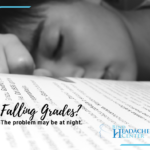Childhood sleep apnea is a serious condition that can have a negative impact on children’s academic performance, according to new research. The study, conducted by the University of Otago in Dunedin, New Zealand, found that sleep apnea may interfere with getting a good night’s sleep and contribute to children having difficulty paying attention and performing academically during the day.
The study looked at the results of more than a dozen individual studies and found that most of them accounted for other major factors that could influence school achievement.
Sleep apnea is a type of sleep-disordered breathing in which a person stops breathing for short periods of time while asleep, typically as a result of blockages that occur in the airway during sleep. These blockages are typically caused by the tongue falling back to block the airway or by the throat muscles becoming too relaxed.
These blockages cause the body to wake fully or partially during the night. The result is a lack of restorative sleep.
Why Is Restorative Sleep Important?
Restorative sleep is important for children because it helps them to process and retain information, as well as to stay focused during the day. Without enough restorative sleep, children may have difficulty concentrating and paying attention in class, which can lead to lower grades.
The study also found that children with sleep apnea were more likely to suffer from other conditions such as depression, anxiety and behavioral problems.
In addition to the negative impact on academic performance, sleep apnea can have serious health consequences for children. Childhood sleep apnea can lead to high blood pressure, heart problems and even stroke.
What Causes Sleep Apnea in Kids?
Childhood sleep apnea is usually caused by enlarged tonsils and adenoids, which can block the airway. Other causes include obesity, allergies and anatomical abnormalities of the nose or throat. Other causes include genetic syndromes, neuromuscular disorders, endocrine disorders and problems with the alignment of the jaw.
Children With Sleep Apnea
Children with childhood sleep apnea or sleep disorders often experience:
- Snoring
- Restless sleep and difficulty staying asleep
- Pauses in breathing during sleep
- Excessive daytime sleepiness
- Mood swings
- Irritability
- Bedwetting
- Nightmares/night terrors
Another consequence of obstructive childhood sleep apnea is difficulty paying attention and poor performance in school.
What’s the Connection Between Obstructive Sleep Apnea and Poor Academic Performance?
With sleep-disordered breathing, your child may not be getting restful sleep each night — no matter what time you put them to bed. This situation can cause fatigue and exhaustion, which can lead to poor concentration in class and lower grades.
A 2010 study, funded by the American Sleep Medicine Foundation, the National Institutes of Health’s National Heart, Lung and Blood Institute, and the National Center for Research Resources, showed that school grades of children and teens with moderate to severe obstructive sleep apnea were worse than the grades of children without any sleeping disorders.
Results suggested an association between moderate to severe obstructive sleep apnea (OSA) and both poorer test scores and parent/teacher-reported behavioral issues. In fact, these findings stayed reliable after considering gender, ethnicity, household income level and how long the student slept on school nights. Those with moderate to severe OSA received a half-letter grade lower in their schoolwork than those with no evidence of sleep disruption. Not one of the individuals identified with moderate to severe OSA had an “A” average, and 30 percent earned no more than a “C.” Comparatively, around 15 percent of people without signs of sleep interruption had an overall “A” average, while 15 percent or fewer had below a “C” average.
Think about it. If you are tired or have gotten poor sleep, do you have a hard time concentrating on your work or tasks you have to do every day? The same goes for your child.
Insufficient sleep is a serious situation that can definitely impact the academic grades of children living with the condition.
Treatment for Childhood Sleep Apnea
It is important for parents to be aware of this potential issue so they can take steps to ensure their child gets enough restful sleep each night.
Treatment for sleep apnea in children depends on the underlying cause. If enlarged tonsils and adenoids are causing the problem, surgery may be recommended to remove them. Other treatments include weight loss, avoiding allergens, using a CPAP machine or using an oral appliance.
It is important to note that even with treatment, it can take some time for your child’s grades to improve. It is important to be patient and supportive during this process.
Want to learn more? Call us now to schedule a consultation.

